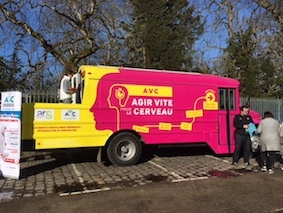
2016 saw ARS Île-de-France and France AVC Île-de-France set up the AVC bus – or stroke bus – a mobile educational and screening campaign designed to help people minimise their risk of suffering a stroke. At each venue across Yvelines, the public had the opportunity to learn more about strokes and to undergo tests to establish their own stroke risk. The tour was so successful that, the following year, it was extended to include both Val-d’Oise and Yvelines. Sandrine Aulagner, Marketing Manager for FUJIFILM Sonosite in France and Belgium, caught up with the AVC bus as it arrived at Rambouillet, to see how point-of-care ultrasound contributes to the screening process.
Stroke is a potentially life-threatening condition, so it is really important that people know what the symptoms are, and understand that it is a medical emergency requiring immediate action to minimise the likelihood of irreversible damage occurring. There is a lot that people can do to help prevent a stroke, and this is the reason that the stroke bus tour was started. The tour gives the public the chance to learn about stroke and be risk assessed, giving them information that could potentially save their lives.
The stroke bus arrives early in the morning and sets up in a central location, usually somewhere such as the town square. In Rambouillet, where I joined the tour, the visit was planned to coincide with market day to try and attract as many visitors as possible. The tour began in a tent, which acted as an information centre, with posters and a video about strokes, including risk factors and the symptoms to look out for. Visitors could also complete a questionnaire about their lifestyle – for example, whether they smoked or suffered from medical conditions such as diabetes – and there was even a short test to check that they had understood everything they’d heard. It was very quick; the whole process only took about 15 minutes. After that, there was an opportunity to visit the stroke bus for screening. This involved blood tests for diabetes and cholesterol, a blood pressure check for hypertension, and an ultrasound scan of the carotid arteries to check for atheromatous plaques and measure the intima-media thickness (IMT), which are risk factors for stroke.
Ultrasound imaging provides important information to help risk assessment and detection of strokes, and FUJIFILM Sonosite loaned an M-Turbo point-of-care ultrasound system for the tour. The system’s small size is ideal for the stroke bus, where space is very limited, and it is easy to use. The doctors were able to screen patients very quickly, visualising the carotid arteries – the vessels that supply the brain – to evaluate the IMT and look for plaques that could potentially break off and cause a cerebral clot. When a patient sees the image, sees that the artery is clogged, they realise immediately that they are at risk of a stroke and need to see a doctor for advice on altering their lifestyle. It really drives home the message that there is a high probability of suffering a life-changing vascular accident.
Once all the tests were completed, the screening results were discussed with the individual, explaining any risk factors identified, such as high cholesterol, hypertension, diabetes, smoking, or an unhealthy lifestyle. Each person was also given a report detailing the results, which they could then share with their own doctor. In some cases, the results were a wake-up call, and advice was provided on how to change their lifestyle and eating habits to prevent problems in the future. In other cases, for example, if a plaque was found, they were referred to their own doctor for further tests.
The stroke bus campaign is proving a great success. Encouraging people to look after themselves not only helps to decrease the number of people suffering from strokes, it also reduces the associated healthcare costs. And when you think that it costs between 8,000 and 40,000 Euros to treat a stroke patient, there is a clear economic advantage to this educational initiative. During the previous campaign, around 1,000 people visited the tour and 700 of them chose to be screened to assess their stroke risk. Of these, 30 per cent were referred to a doctor for further tests, highlighting exactly why the campaign is so important.
Sonosite, the Sonosite logo and M-Turbo are trademarks and registered trademarks of FUJIFILM Sonosite, Inc. in various jurisdictions. FUJIFILM is a trademark and registered trademark of FUJIFILM Corporation in various jurisdictions. All other trademarks are the property of their respective owners. Copyright (c) 2018 FUJIFILM Sonosite, Inc. All rights reserved. Subject to change.
Medical scope of practice can vary by state, country and/or local jurisdiction.
While FUJIFILM Sonosite supports the improvement of healthcare in the global community, we do not officially endorse any of the charities and organisations that are mentioned, or linked to, on our Global Health page.

